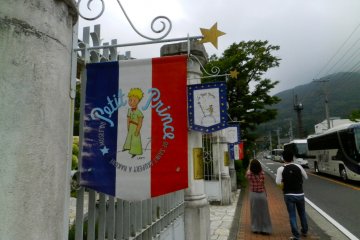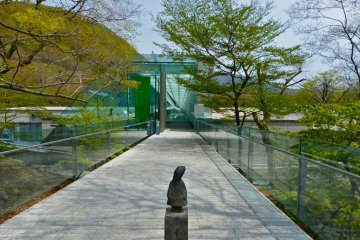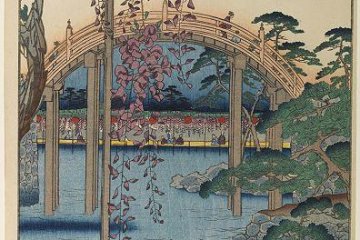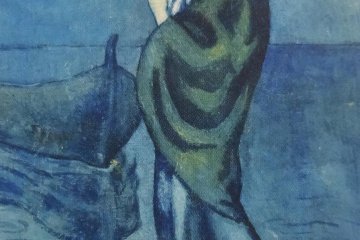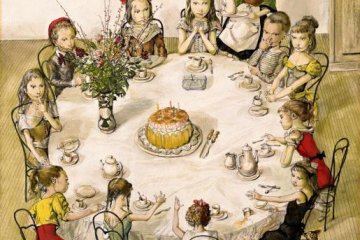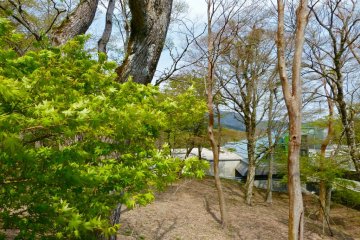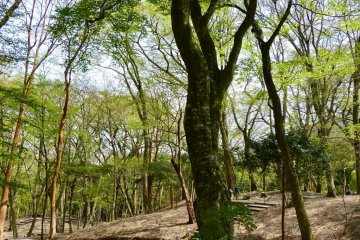The POLA Museum of Art collection features a large number of pieces from the private collection of Tsuneshi Suzuki (1930-2000), the son of the founder of the Pola Orbis Group. He collected oil paintings, sculptures, ceramics, glasswork, and cosmetic tools, for more than 40 years, especially focusing on Monet, Cezanne, Renoir, Picasso, Chagall, and other 19th and 20th century artists. In the middle of the Sengokuhara forest, you will find this wonderful space—where nature collaborates with world class art.
Collector Tsuneshi Suzuki
Tsuneshi Suzuki succeeded his father as head of POLA when he was only 23. He loved art and started to purchase paintings at the age of 28, beginning with pieces by Leonard Fujita. Suzuki took a systematic approach with his collection from the beginning. Although he rarely commented on any of the works he procured, it is obvious that he followed the stream of art from the 19th and 20th century.
Museum Building
The museum itself is almost hidden in the forest. Or the forest protects the museum carefully in its arms. At least, I felt like that when I walked a trail around the museum. The architects said that the concept of the museum is to harmonize with the nature of Hakone.
After entering the building, take the escalator down to B1F. This gallery shows a selection of some of Suzuki’s favorite pieces, beginning from when he started to collect all the way through to when he passed away in 2000. One floor below that, there are four more galleries exhibiting oil paintings, glassworks, cosmetic utensils from Art Nouveau and Art Deco, and oriental ceramics. A café and restaurant in the museum give you a chance to take a comfortable rest after bathing in this wonderful shower of art. It is quite cozy sitting near big windows that open to fresh forest green.
Some pieces from the collection
“Birthday” by Leonard Fujita is cute yet cynical. Eleven kids dressed up for a birthday party are sitting around a table, while six other kids are watching this scene enviably through a window.
“Kimono with Iris Pattern” by Saburosuke Okada shows a Japanese woman and her beautiful kimono. We see the back of the woman’s enticing shoulder and her neckline. Her kimono has half slipped from her right shoulder, and it makes her soft white body prominent, contrasted with the blue kimono.
“Water-lily Pond” by Claude Monet is one of 250 from Monet’s water-lily series. The motif of the bridge and pond is said to have been inspired by Hiroshige’s “Kameido-tenjin Keidai.”
“Mother and Child by the Sea” by Pablo Picasso is from when Picasso was 20 years old. A tiny red flower that the mother holds in her hand is impressive in this dark blue picture. After Suzuki acquired this painting, he often looked at it when the company was facing a difficult situation.
About this series
Hakone has a lot of nice museums, set in the middle of beautiful nature. Seven of them are of a very high level and are truly recommendable. Please breathe fresh air and sharpen your artistic sense in Hakone!
1 Hakone Open-air Museum: Enjoy magnificent art in the great outdoors (by Larry Knipfing)
2 Hakone Museum of Art, Garden: A stunning autumn contrast of red, yellow and green
3 Hakone Venetian Glass Museum: From antique glass treasure to modern fine art
4 Museum of the Little Prince: The world of Antoine de Saint-Exupéry
5 Lalique Museum, Hakone: From brilliant jewelry to gorgeous glass art
6 POLA Museum of Art: Tsuneshi Suzuki and his passion for art
7 Narukawa Art Museum: The best view point of Ashino-ko Lake and Mt. Fuji





